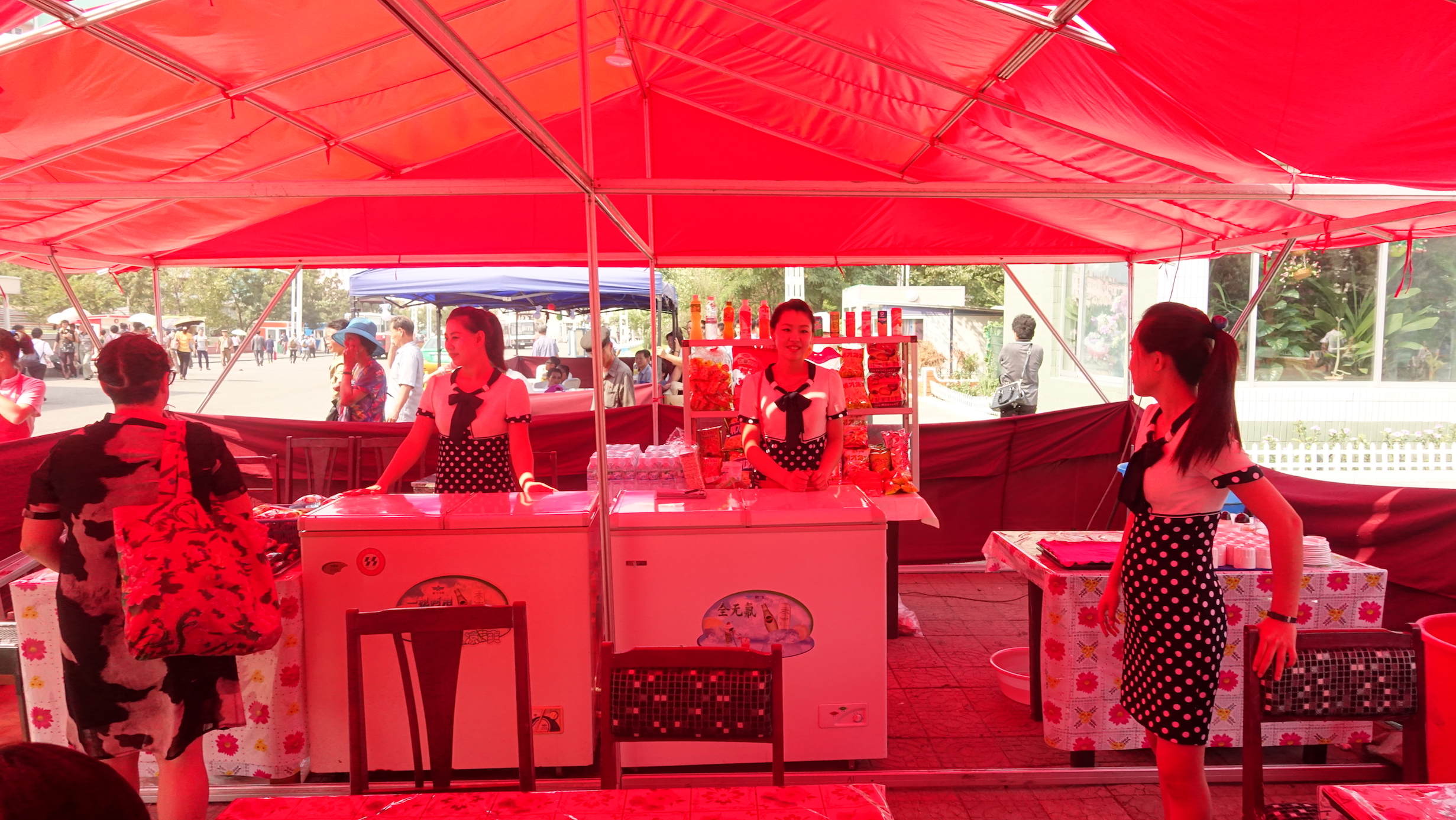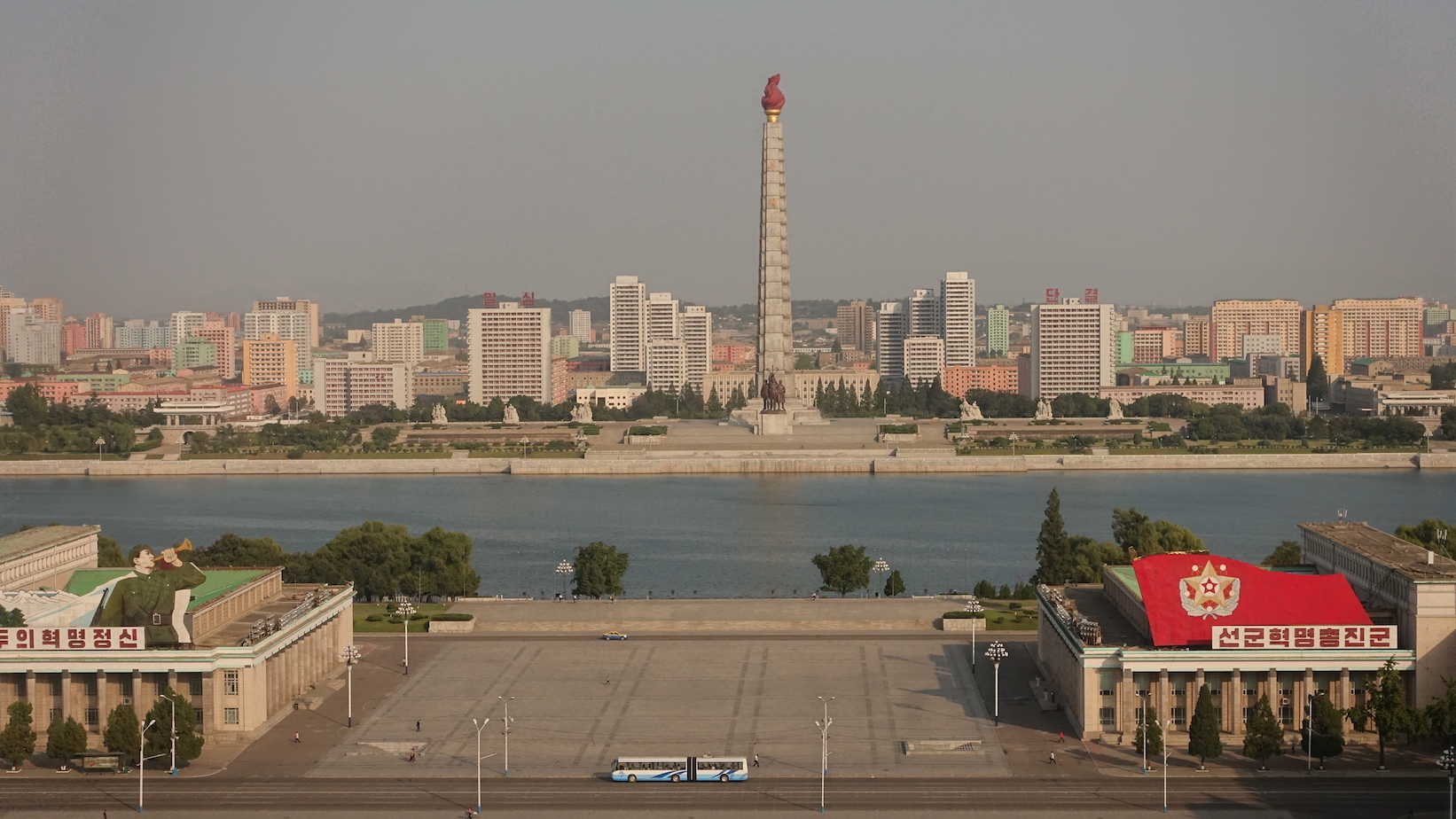
The drab, grey exterior of Kwangbok Supermarket blends easily into its surroundings in Pyongyang. The building does not aspire to resemble a gleaming mall, nor does it need to. For the majority of the city's three million residents, the sheer experience of shopping at a supermarket is enough of a draw.
In North Korea, most citizens still depend on state-supplied rations, which are known for being meagre. The United Nations, in a plea for aid issued in 2015, claimed that 70 percent of the country's population was food insecure. According to Jean Lee, the former chief of the Associated Press's Pyongyang bureau, even middle-class people in the capital generally shop at Soviet-style stores, where they queue up at counters to request items, and there is "no browsing, and not much choice even if you could."
Kwangbok, on the other hand, offers plenty of options. Such surfeit, which grants shoppers a feeling of autonomy, is rare in this socialist society. The supermarket's three floors are stacked with imported items nearly impossible to find elsewhere in the country. But even as its shelves display luxury goods, a closer look at Kwangbok underscores the inequality that is rampant in today's North Korea.
Often referred to as the "Hermit Kingdom," North Korea is one of the world's most isolated countries. The authoritarian regime that came to power here in 1948—the year the country was formally established as the Democratic People's Republic of Korea—is now under the rule of Kim Jong-un, the grandson of the country's founding father, Kim Il-sung. Since its inception, the communist nation has chosen to shut the gates on its society to such an extent that outsiders have little idea of the lives of ordinary North Koreans.
Foreigners can only visit the country through recognised agencies, which tightly control their movement. Tourists must always be accompanied by two minders, and spontaneous interactions with citizens are strictly forbidden. Such were the conditions laid upon me when I spent a week in the country in September. I had to submit requests for activities at least 12 hours in advance and wait for my minders to tell me, after a flurry of phone calls, whether they were possible. Seeing Kwangbok, however, required no convincing; local guides were eager to display the supermarket as a symbol of their capital's development.
In Pyongyang, the North Koreans who did not shy away from talking to me spoke as if reading from a script. Mentions of the ruling regime's generosity popped up frequently, and descriptions of their own lives seemed strangely idyllic. "On Sunday, I wake up around noon and go for brunch with my friends, followed by some games or shopping," said one of my minders, a young, exuberant woman. She did not mention the mandatory self-criticism group sessions, often held on Sundays, where citizens are supposed to reflect on their behaviour and pledge to improve on their shortcomings.
At no point did anyone I interacted with acknowledge the regime's human-rights violations, including the forced-work concentration camps that have earned North Korea crippling US and UN sanctions. Remaining tight-lipped is prudent on the citizens' part. The government denies all allegations of abuse in the camps, terming them "re-education centres" instead. Numerous defectors from North Korea have revealed in interviews that a single deviation from the official line can get an offender sent to "the mountains"—the common euphemism for the concentration camps—indefinitely.
Before I entered Kwangbok, my minders sternly informed me that I could not take photographs in the market, and that I was only to spend 30 minutes inside. I was taken to a counter, where a woman on the other side of a window offered me something forbidden to visitors anywhere else in the country: the national currency, the North Korean won.
Throughout their stay, foreigners must pay for souvenirs or food using US dollars, European euros or Chinese renminbi—all of which are valued at exorbitant exchange rates. For example, while one US dollar is worth 8,000 won for locals, it yields only 100 won for visitors. Kwangbok is the only place in North Korea where foreigners can convert their money into won, and hold notes with illustrations of a scientist and student staring heroically into the distance, or the Arch of Triumph in Pyongyang. (No minder will fail to point out that it is taller than the one in Paris.) The highest denomination bill, worth 5,000 won, bears an image of the birthplace of Kim Il-sung.
After exchanging my money, I entered the shopping area. The expansive ground floor buzzed with activity, despite it being a weekday morning. I noticed that all local shoppers had to place their bags, packets and purses inside clunky tote bags, which were sealed shut for the duration of their shopping. "Why is that?" I asked one of my minders. "The supermarket was forced to start this after some incidents of shoplifting," she said, hanging her head.
The North Koreans who shop at Kwangbok are from the slim slice at the top of Pyongyang society. They have often worked for government ministries, represented North Korean trade or diplomatic interests abroad, or inhabited some part of the country's miniscule industrial manufacturing sector. These people usually have one thing in common: their vocations earn them foreign currency, which they can exchange for bountiful won. The father of my female minder owned a North Korean restaurant in China, through which he earned renminbi. Among the local shoppers I saw at Kwangbok, everyone was better dressed and, on average, had plumper cheeks than the people I saw near construction sites or crammed into trams elsewhere in Pyongyang.
Kwangbok's selection of goods was impressive, if whimsical. There were more Chinese brands than I could count, but I spotted Siemens washing machines and Panasonic refrigerators too. The prices, however, were exorbitant. A loaf of bread cost 6,900 won—less than $1 for locals, but nearly $70 for foreigners. The cheapest sanitary pads were priced at 2,100 won. The main attraction for a group of young women was a shelf of Kumgangsan cosmetics. "They contain ginseng from Kaesong"—a city in North Korea—"as their primary ingredient," my female minder gushed. "They turn your skin fairer!"
For culinary enthusiasts, there was extra-virgin olive oil selling for 185,900 won a bottle—around $1,800 for foreigners. Even for locals, though, owning the bottle requires plumping up the equivalent of $20—a princely sum in a city where the official government salary is less than $10 a month. While the olive oil stayed undisturbed, many locals picked up meat and bread, weaving between shelves as if repeating a routine.
Kwangbok Supermarket was opened in 2012 in partnership with Feihaimengxin International Trade Company: a private company registered in Beijing, China. The Chinese partner owns 65 percent of the venture—an odd situation for the North Korean government, whose guiding philosophy is juche—"self-reliance." The supermarket's name is emblazoned on its exterior in both Chinese and Korean characters.
"The impetus behind the undertaking of such joint ventures need not always be the Chinese central government directly," said Robert Winstanley-Chesters, a scholar of North Korea at Australian National University, in Canberra. "Joint ventures can also emerge from local or regional economic interests." But, he explained, even a joint venture arising out of corporate interests can quickly become aligned with state interests. For the Chinese Communist Party, encouraging ventures such as Kwangbok is a way of supporting its neighbour on the Korean peninsula in its rivalry against South Korea—a US military ally. China is also wary of the stream of refugees that would pour across its border were the current North Korean regime to collapse. It is hard to gauge Feihaimengxin's incentives; the company did not respond to my calls or emails.
Increased Chinese economic engagement with North Korea is introducing some things hitherto inaccessible to the Hermit Kingdom's wealthiest citizens. "Exact figures will rarely leave North Korea, but the supermarket definitely seems profitable," said Andray Abrahamian, who conducts entrepreneurship workshops in North Korea through a non-profit organisation.
Yet, the manifestations of such engagement with China, such as Kwangbok's forbidding prices, only set Pyongyang's inequality into sharper relief. "A few days into any visit, we have to remind people that North Korea is not as good as it seems," said Vicky Mohieddeen, a consultant at an organisation that facilitates tourism to the state. "This is still a remarkably poor country, and very few citizens are able to enjoy the pleasures in Pyongyang that they show the outside world."
Once the allotted half-hour had passed, my minders ushered me out of the building into an open parking lot, muttering that I had already "spent too much time" inside. My eyes, still full of the gleaming-white appliances, bright-red cereal boxes and green cosmetics, took a while to adjust back to Pyongyang's skyline. Everything was grey again.


